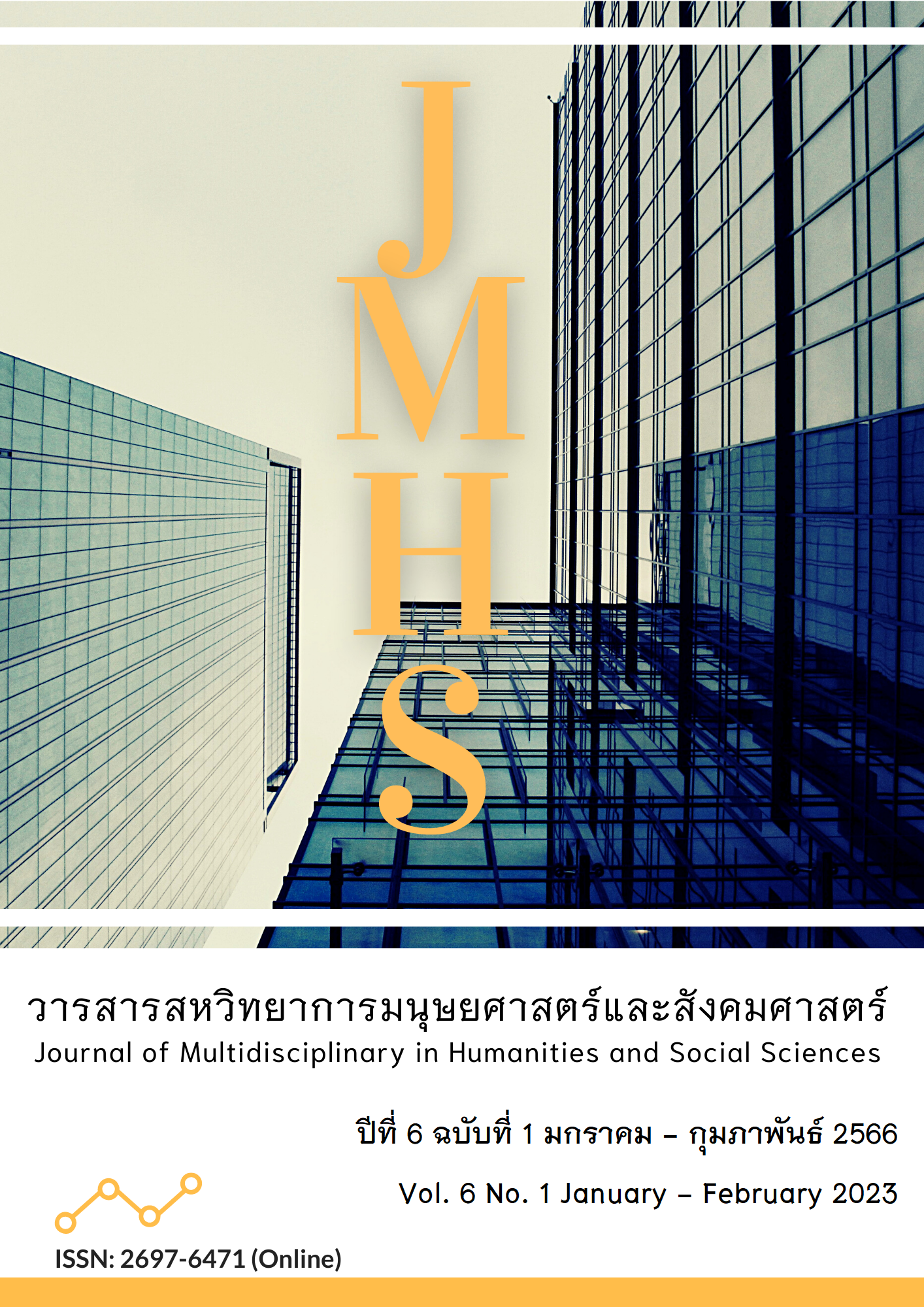The Development of Public Mind Reinforcement for Early Childhood Education Major Students of The Faculty of The Faculty of Education, Nakhon Phanom University
Main Article Content
Abstract
The purposes of this research were (1) to develop the model of public mind reinforcement and (2) to assess the model of public mind reinforcement for early childhood education major students of the Faculty of Education, Nakhon Phanom University. The samples consisted of 145 early childhood education major students who studied in the 2nd semester of the academic year 2021. They followed Krejcie and Morgan’s table in the sample size specification, and they were selected by stratified random sampling. Three instruments were used in the research: (1) a questionnaire about public minds; (2) a structured interview form; and (3) an assessment form. The statistics used were percentage, mean, and standard deviation.
The results showed that 1. the models of public mind reinforcement for early childhood education major students of the Faculty of Education, Nakhon Phanom University revealed 12 aspects, namely: 1) participation; 2) communication; 3) analysis and criticism; 4) self-esteem; 5) social responsibility; 6) problem solving ability; 7) love, generosity, and unity; 8) values; 9) ethics; 10) future orientation; 11) self-identity; and 12) knowledge and the ability to seek knowledge. There were seven approaches for the development: volunteering, teamwork, speaking practice, teaching practice, indoctrination, training, and praising. 2. The assessors reached consensus at the highest level in all 7 approaches, namely volunteering, teamwork, speaking practice, teaching practice, indoctrination, training, and praising.
Article Details

This work is licensed under a Creative Commons Attribution-NonCommercial-NoDerivatives 4.0 International License.
Views and opinions appearing in the Journal it is the responsibility of the author of the article, and does not constitute the view and responsibility of the editorial team.
References
กนกวรรณ วังมณี. (2563). การพัฒนาจิตสาธารณะของนักศึกษาครูมหาวิทยาลัยราชภัฏเชียงรายด้วยโปรแกรมการฝึกอบรมจิตสาธารณะ. วารสารครุศาสตร์ จุฬาลงกรณ์มหาวิทยาลัย, 48(3), 1-20.
เกษม วัฒนชัย. (2560). พระบรมราโชบายด้านการศึกษาของสมเด็จพระเจ้าอยู่หัวรัชกาลที่ 10. สืบค้นเมื่อ 16 มกราคม 2565, จาก https://www.attth.org/พระบรมราโชบายการศึกษา.
ชาย โพธิสิตา และคณะ. (2540). จิตสำนึกต่อสาธารณะสมบัติ: ศึกษากรณีกรุงเทพมหานคร. นครปฐม: สถาบันวิจัยประชากรและสังคม. มหาวิทยาลัยมหิดล.
ชัยรัฒน์ สุทธิรักษ์. (2552). สอนเด็กให้มีจิตสาธารณะ. กรุงเทพฯ: วีพรินท์.
ธนิดา ทองมีเหลือ. (2550.) ปัจจัยทางจิตสังคมที่ส่งผลต่อจิตสาธารณะของนิสิตมหาวิทยาลัยศรีนครินทรวิโรฒ. วารสารพฤติกรรมศาสตร์, 13(1), 91-102.
พระไพศาล วิสาโล. (2554). จิตอาสาแค่เปลี่ยนมาให้ความสุขก็เข้ามาในจิตอาสา สุขง่ายๆ แค่ลงมือทำ. กรุงเทพฯ: ส.เอเชีย เพลส(1989).
ไพฑูรย์ พวงยอด. (2564). รองคณบดีฝ่ายบัณฑิตศึกษาและกิจการนักศึกษา. สัมภาษณ์, 19 ตุลาคม 2564.
ไพฑูรย์ สินลารัตน์. (2560). อุดมศึกษาสาขาวิชาที่ถูกลืม. กรุงเทพฯ: จุฬาลงกรณ์มหาวิทยาลัย.
ภัทรภร สีทองดี. (2560). การพัฒนารูปแบบการสร้างเสริมจิตสาธารณะของนิสิตในสถาบันอุดมศึกษาของรัฐ: กรณีศึกษา มหาวิทยาลัยศรีนครินทรวิโรฒ. วารสารศึกษาศาสตร์ มหาวิทยาลัยบูรพา, 28(3), 63-74.
สุวิมล ติรกานันท์. (2556). สถิติและการวิจัยทางการศึกษาเบื้องต้น. (พิมพ์ครั้งที่ 10). กรุงเทพฯ: มหาวิทยาลัยรามคำแหง.
สำนักงานเลขาธิการสภาการศึกษา. (2560). แผนการศึกษาแห่งชาติ พ.ศ. 2560-2579. กรุงเทพฯ: พริกหวานกราฟฟิค.
สำนักงานเลขาธิการสภาการศึกษา. (2562.) การวิจัยและพัฒนารูปแบบกลไกการเสริมสร้างวินัยนักเรียนในสถานศึกษาระดับการศึกษาขั้นพื้นฐาน ด้านการมีจิตอาสา เสียสละ เห็นอกเห็นใจผู้อื่น. กรุงเทพฯ: พริกหวานกราฟฟิค.
สุพีรพัชร์ พิมพ์มาศ และคณะ. (2564). การศึกษาคุณลักษณะการรับใช้สังคม สำหรับนิสิตปริญญาตรี มหาวิทยาลัยศรีนครินทรวิโรฒ. วารสารสังคมศาสตร์และมานุษยวิทยาเชิงพุทธ, 6(4), 227-240.
สำนักงานคณะกรรมการพัฒนาการเศรษฐกิจและสังคมแห่งชาติ. (2562). ยุทธศาสตร์ชาติ พ.ศ. 2561-2580. กรุงเทพฯ: สำนักงานเลขานุการของคณะกรรมการยุทธศาสตร์ชาติ.
หฤทัย อาจปรุ. (2544).ความสัมพันธ์ระหว่างปัจจัยส่วนบุคคล ภาวะผู้นำ รูปแบบการดำเนินชีวิต และความสามารถในการเรียนรู้ด้วยตนเองกับการมีจิตสำนึกสาธารณะของนักศึกษาพยาบาล เขตกรุงเทพมหานคร. กรุงเทพฯ: จุฬาลงกรณ์มหาวิทยาลัย.
อนุพนธ์ คำปัน. (2559). การศึกษาองค์ประกอบจิตสาธารณะของนิสิตนักศึกษาในสถาบันอุดมศึกษาในเขตกรุงเทพมหานคร(ดุษฎีนิพนธ์การศึกษาดุษฎีบัณฑิต) มหาวิทยาลัยศรีนครินทรวิโรฒ.
อริสสา สะอาดนัก. (2557). ทักษะจากการเรียนรู้ในศตวรรษที่ 21. กรุงเทพฯ: คณะวิทยาการจัดการมหาวิทยาลัยศิลปากร.
Gutersloh. (2003). Civic-Mindedness Participation in Modem Society. Retrieved June 9, 2022, from http://www.bertelsmann-stiftung.de/cps/rde/xchg/bstengl/hs.xsl/publikationen_ 2818.htm
Krejcie, R. V., & Morgan, D. W. (1970). Determining Sample Size for Research Activities. Educational and Psychological Measurement, 30(3), 607-610.
Reader's Digest Universal Dictionary. (1999). Reader's Digest Universal Dictionary. New York: Brepols Fabrieken.
Roth, G. (1987). The Private Provision of Public Services in Developing Countries. USA: Oxford University.
Smart, D., Sanson, A., Silva, L.D., & Toumbourou, J.W. (2000). The Development of Civic Mindedness in Australian adolescents. Family Matters, 57(Spring/Summer), 4-9. Retrieved from https://www.researchgate.net/publication/292124642_The_development_of_civic_mindedness_in_Australian_adolescents


